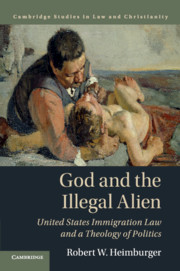'In the heated debates around 'illegal aliens' several matters cry out for explanation. Where did the term 'alien' arise, and when did it first appear in US law? Why do current immigration laws view foreigners like they do? Such questions require historical awareness and, for the Christian, substantive theological reasoning. Heimburger presents a legal history and offers a rich theology for the government’s role in God’s economy as 'neighbor'. This is a fresh, needful framework for our times.'
M. Daniel Carroll R. - Blanchard Professor of Old Testament, Wheaton College, Illinois and author of Christians at the Border: Immigration, the Church, and the Bible
'God and the Illegal Alien is a highly original contribution to the ethics of immigration. It is the most comprehensive, ecumenical, and lucid treatment of the subject that I know of from a theological perspective. At the same time, by careful attention to revealing details in American legal history, biblical sources, and political thought, Heimburger provides an impressive work of political theology that makes concrete what can be abstract in the renewed attention to that subject.'
Eric Gregory - Princeton University, New Jersey
'Robert W. Heimburger provides a compelling approach that defies otherness and difference in favor of foundational Christian ideals of love, caring, decency and respect. Drawing upon historical, theological, and legal sources, Heimburger reconfigures the current adversarial landscape by assessing theological debates about the common migrant roots that we all share, and the fundamental liberal values and the legal history that underwrite and provide legitimacy to the very idea of America.'
Robert F. Barsky - Vanderbilt University, Tennessee
'What is most impressive about God and the Illegal Alien is the depth and range of its theological appropriations. Heimburger demonstrates how potentially rich are a Christian’s resourcesfor thinking through, for instance, the value of the immigrant, the responsibilities of government, and the mission of the church. Each component of his reflections are elements for a thorough-going Christian engagement with immigration realities. The author has performed a wonderful service by carefully, and painstakingly, showing us that what Christians need is a good theology of politics to guide their thinking on this debated topic.'
Source: Latin American Theology
'Heimburger’s text is both timely and curious. Migration policies are on the front line of today’s public policy discussions. His engagement of these policies through a theology of politics, though, is a complicated interweaving of arguments from common law, philosophy, scriptural exegesis, and the history of U.S. immigration practices.'
John Francis Burke
Source: Journal of Church and State
‘… Heimburger’s work has the greatest promise, as it piggybacks on the weakness of democracy (democratic caprice), using its networks for good.’
Myles Werntz
Source: Marginalia LA Review of Books
'Anyone working in this field (myself included) stands to benefit from Heimburger’s careful legal-historical work. Heimburger also sets a high bar for scholars with interdisciplinary inclinations. And everyone should wrestle with his theology of politics. These are just a few of the great gifts Heimburger has given us in a book deserving of a wide readership.'
Justin P. Ashworth
Source: Modern Theology
‘I enjoyed this book very much, and I would recommend it to my fellow Americans …’
John S. W. Park
Source: Law and Politics Book Review



